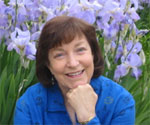Welcome to The Writer's Almanac Bookshelf, where you'll find highlighted interviews of poets heard on the show.
Barbara Crooker
 Q: Tell us about your new book Radiance.
Q: Tell us about your new book Radiance.
It's my first full-length book, which only took me fifteen years (!) to place. Publishing poetry is very difficult these days; mostly, you have to win a contest, and most of them have around 800 entries. The top ten or so get to be finalists, which is where I spent the last ten years, but the contest route is like the game of Chutes and Ladders—you can get close to the top, but if you don't win, you slide back down to the bottom and have to start all over again.

Radiance:
Poems by Barbara Crooker
(books by this author)
"Radiance is a pleasure to read, straight through, for its humour and intelligence and for the sheer bravery of sentiment. It dares to show deep feeling, unguarded by irony. It's a straight-ahead passionate book by a mature poet and rather suddenly I've become a fan."
–Garrison Keillor
Also, I've been a mother-at-home with a child with autism, so I've been pretty much out of "the loop"— don't have a mentor, haven't studied with anyone famous, etc. I've just been writing ...and also steadily publishing, over 500 poems in small literary magazines and places like Yankee and Christian Science Monitor, anthologies like Worlds in Their Words: Contemporary American Women Writers, over ten college texbooks ... but no first book.
It was a very happy day indeed when I found out I'd won the Word Press First Book Award!
Q: What are the themes this book explores?
Some of the themes in the book include love in a longterm relationship ("Away in Virginia, I See a Mustard Farm and Think of You"), aging and the body ("Nearing Menopause, I Run Into Elvis at Shoprite") ("In the Middle"), French Impressionist paintings (there are poems referencing work by Monet, Manet, Renoir, Van Gogh, and Cézanne, besides the title poem, which is based on a Hudson River School exhibit), my son with autism ("The Grid"), and the radiant natural world around us ("Praise Song").
I'm always concerned with and fascinated by the objects of ordinary life ("Ordinary Life," which isn't in this book), and how something like hanging wash on the line might turn into a poem.
Q: How did you decide to begin writing poetry?
I didn't get started until I was in my late 20's, a single mother with a small child. Part of this was because although I'd taken courses like "Contemporary American Literature," (dead white men) I was pretty much unaware of what LIVING contemporary writers were up to.
My ex had left some of his books behind, including a copy of The Eagle, a little magazine from Mansfield State College in northern Pennsylvania. I read it, and was blown away by some of the poetry, especially that of Diane Wakoski, who I thought in my ignorance was an undergraduate there. Perhaps if I'd realized she was a famous writer, I'd have been intimidated, but I read her work over and over, trying to figure out how she got from point A to point B.
And then I wrote a couple of poems. And I liked how they turned out, eventually, and so I kept writing. Later, I learned I needed to do more reading, especially of contemporary writers, and so my self-education began. It's still the best advice I can give beginning writers: read, read, read.
Q: What are the projects you are currently working on?
I have three more manuscripts in progress; the one that's circulating now is called Line Dance. The title poem came from my oldest daughter's wedding, and it's about, in part, all our many connections, family, friendship, etc.
Another manuscript, The Book of Hours, touches on the illuminated manuscript Les Très Riches Heures du Duc de Berry.
Barbara Crooker's book Radiance won the Word Press First Book Award. She has also won the Thomas Merton Poetry of the Sacred Award and three Pennsylvania Council on the Arts Fellowships in Literature. She lives and writes in rural northeastern Pennsylvania with her husband and son; two daughters are grown, and she has one adorable grandson.